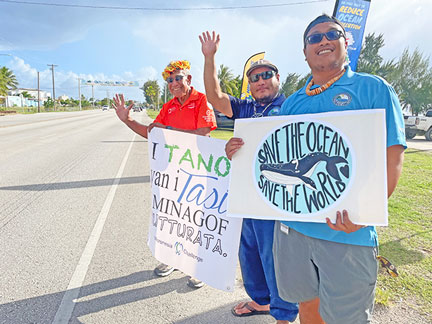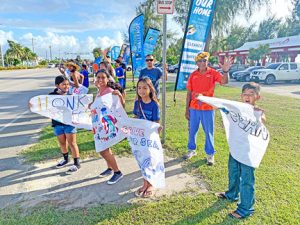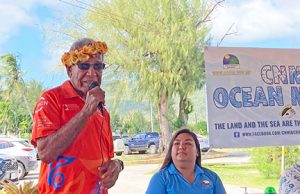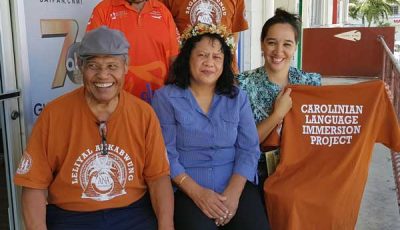Master navigator Lino Olopai and the tale of the tagafi
June is CNMI Ocean Month

Ocean elder and master navigator Lino Olopai waves along the road by the Minachom Atdao Pavilion in Susupe, with environmental stewards from the Bureau of Environmental and Coastal Quality, to welcome the CNMI Ocean Month of June. (Iva Maurin)
It was right after the Second World War, young Lino would go out fishing, swimming in a current, with his uncle. With them were an abundance of small fish, as well as colorful fish. One small cut on the arm or leg, and the smaller fish would come and nibble on it.
They would catch the tagafi—big red snappers that cannot just be caught with a spear gun because of their size. But, Lino’s uncle taught him a technique on how to catch the tagafi, something which made him giggle underwater.
His uncle would intentionally throw up to him five fish at the same time, and being a kid, he would have trouble catching them and putting them on a fish line, and Lino would end up dragging the fish line. Every now and then, a tagafi would go in and swallow one of Lino’s fish, and swim on.
They caught the tagafi. With a piece of loin cloth and a small rock tied to it, they lured the red snapper with a fish. Trapped, the tagafi eventually tired itself from swimming, tired from having to drag the rock.
To young Lino, being in the ocean felt like swimming in an aquarium. Traditional fishing was very compatible with the ocean. They would fish in one area on day, and then on the other side of the island the next day, to make sure that the fish supply recovers. Back then, the ocean was very rich.
Many decades after, and seeing how the CNMI has developed and changed, ocean elder and master navigator now Lino Olopai asks—how much development do we need?

Ocean elder and master navigator Lino Olopai welcomes the Ocean Month of June waving along the road by the Minachom Atdao Pavilion in Susupe, with children from the Friends of the Mariana Trench. Olopai, who was the keynote speaker during the proclamation signing for the Ocean Month, shared stories of him as a young boy catching fish, reminiscing on the abundance of the CNMI oceans right after the second world war. (Contributed Photo)
“Whatever we do on land interrupts the ocean quality and the marine life. What are we going to do about it? We need that balance… This is such a sensitive issue, that if we fail to strike that balance, it’s a big loss for you and me, for all of us.”
Olopai spoke before government leaders and ocean stewards in the community last Tuesday, June 1, to highlight the importance of the ocean, as the CNMI celebrates the Ocean Month of June.
“Our ocean resource, if we are not careful on how we develop our island and how we prepare with it, it’s a big loss for all of us. We must do something about it. Do we need to continue to develop to where we are today, or [do we] slow it down and see if we can have that balance so that we can continue to have our ocean resources?” he stressed.
Over and over, he asked, “When are we going to learn?”
The CNMI ocean economy
At the proclamation of June as Ocean Month last Tuesday, it was stated that the CNMI ocean economy employs up to 8,300 people annually, roughly 40% to 50% of its local employment, and contributing to about $922 million toward the annual gross domestic product in the Commonwealth.
A 2019 study of the Eastern Research Group, valuated the ecosystem services from coral reef and seagrass habitats in the CNMI at $114.8 million annually.
“The CNMI is home to abundant marine biodiversity and ecosystems that provide valuable services supporting sustainable livelihoods, coastal protection, tourism opportunities, and cultural and recreational uses.”
“However, these resources are constantly threatened due to increasing pressures from land-based activities, such as erosion, vessel groundings, and increased runoff sedimentation and pollution from community, industry, and infrastructure.”
Tourism is the primary industry in the CNMI, and the ocean is a main part of it.
“Tourism is our only industry,” Gov. Ralph DLG Torres said. “This is what we offer our tourism. People pay thousands of dollars to leave their place to come to this beautiful island. A lot of times we don’t know what we have until we lose it. We don’t want to reach that.”
Torres then stressed the need to pass on ocean knowledge to the next generation.

Ocean elder and master navigator Lino Olopai, keynote speaker during the proclamation signing for the CNMI Ocean Month, stressed the need to maintain the balance between the environment and development, and later posed a question to the officials—how much development do we need? (Iva Maurin)
“I just ask that we take care of our ocean as you have, teach our children what we can, learn how to protect and promote our culture. At the end of the day, this is what we have. It’s ours. Each and every one of us has responsibilities, not just us here, but everyone else that lives and calls this island home.”
‘Balancing how we develop’
Addressing the new generation of environmental stewards in the government, mainly from the Bureau of Environmental and Coastal Quality, Lt. Gov. Arnold I. Palacios posed a challenge toward a balanced development.
“I certainly appreciate this young generation of stewards who are working very hard. But, there are times when we impose government policies on you, and I’ll take my small credits of blame. Because, sometimes, for expediency purposes, we need to continue to struggle and continue to work and challenge ourselves to balance how we develop.”
Palacios then shared a story of when he almost lost his job at the Division of Fish and Wildlife for refusing to sign a Coastal and Resources Management permit, where he questioned the capacity of a sewer treatment planning in Sadog Tasi.
“If you don’t believe it is worth permitting a project, don’t, but don’t sit on it. Provide the guidance to the developers. [You are] on the front line of stewardship of our oceans,” the lieutenant governor stressed.
“At the end of the day, it is absolutely correct that we are going to pass this to [the next] generations. I was in your shoes. And I hope that when you [get] to our age, you will look back and say I did the best I can to pass on to the next generation. The ocean is culture. Clean ocean is culture. Whether we like it or not, that’s who we are. That is embedded in our identity.”
2021 June Ocean Month activity calendar
BECQ is continuing the celebration of the CNMI Ocean Month with a beach cleanup at Laolao Bay this Saturday, June 5, 8:30am. Everyone is encouraged to join in and volunteer. Cleaning supplies will be provided, as well as water. Just don’t forget to bring your reusable water bottle!
On June 8, Tuesday, World Oceans Day, the Division of Environmental Quality will also be announcing the winner of the Storm Drain Mural contest participated in by students, who had to paint messages that would raise awareness on the effects of littering to our ocean.
Moreover, the Division of Coastal and Resources Management, with the Micronesia Islands Nature Alliance, also has a social media contest where they’re give away swag bags full of eco-friendly, reusable, and sustainable products. All you need to do is to upload a photo showing how you benefit from the ocean, tag CRM and MINA, and use the hashtags #CNMIOceanMonth, #TeamOcean, and #GoingCoastalCNMI.
For the full contest rule, check out goingcoastal_cnmi on instagram. Winners will be announced every Friday, the entire month of June.
Ocean Fairs will also be held on each of the three main islands of the CNMI. The Saipan Ocean Fair will be held at the Civic Center in Susupe on Saturday, June 12, from 9am to 3pm; at the Jones Beach-Fiesta Ground on Saturday, June 19, from 11am to 3pm; and at Teteto Beach on Saturday, June 26, from 8am to 2pm.
The Ocean Fair is free and open to the public, and will feature educational booths, local arts and crafts, and of course, water activities such as swimming and water safety lessons, snorkeling, talaya lessons, canoe riding, stand up paddling, and more. For additional information about the Ocean Fair, contact Colleen Flores at cflores@dcrm.g.ov.mp or at 664-8300/16.

























